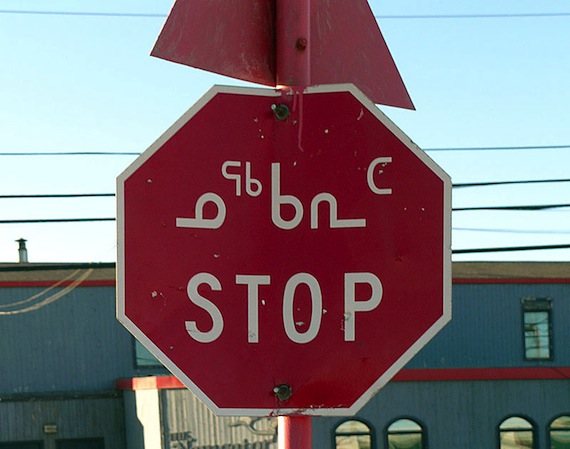Nunavut Inuit welcome language funding boost, but say it’s not enough
Nunavut Tunngavik Inc. says it welcomes a boost in federal language funding towards the protection and promotion of Inuktut in the territory.
But the Inuit organization also says it highlights a major gap between how Indigenous languages and federally-recognized official languages are funded in Canada.
Canadian Heritage announced a new four-year agreement late last month that will deliver $15.8 million towards Inuktut in Nunavut between now and 2020.

The announcement marks the renewal of the Canada-Nunavut Agreement on French Services and Inuktut Language, the previous version of which allotted $1.1 million a year to Inuktut in Nunavut.
The new four-year agreement provides for $1.5 million this year, $4.1 million for 2017-2018 and $5.1 million each year for 2019 and 2020.
“The government called the funding unprecedented, and I agree—it’s good that it’s increased,” said NTI president Aluki Kotierk. “Although it’s good, it’s not enough.”
She points to the same agreement’s investment in French-language services in Nunavut: $14.2 million over that same period.
According to 2011 census population numbers, Nunavut is home to 21,230 mother-tongue Inuktut speakers and 435 mother-tongue French speakers.
Under the new funding agreement, that works out to $8,189 per French speaker per year, compared to $186 per Inuktut speaker per year.
That’s likely explained by the status of the French language which is an official language at the federal level; Inuktut is not. But both are official languages of the territory.
Kotierk said although the agreement injects much-needed new money into Inuktut, it shows a wide gap between two language groups in Nunavut.
“With Canada 150 and one of the themes being reconciliation with Indigenous people, how can this be part of the reconciliation when we continue to perpetuate the inequities?” Kotierk said.
“With the creation of Nunavut, there was an expectation that Inuit would be able to receive programs and services from their government in Inuktut,” she said. “But how can the government do that when they’re not funded adequately and sustainably?”
NTI was not part of the negotiations towards the language agreement, she noted—that is the Government of Nunavut’s domain.
But as an organization that serves Inuit, Kotierk said NTI would have liked to been at the negotiating table.
She said that it’s important to provide that boost to Inuktut now while the language is relatively strong. It may not always be, Kotierk noted, pointing to a recent study that warned that following current trends, only four per cent of Nunavummiut may speak Inuktut by 2051.
“With those kinds of things in the background, it’s really important that Inuktut is resourced sustainably, if we don’t want to lose our language,” she said. “And I think the federal government has a role to play in that.”
Kotierk said she’s “cautiously hopeful” that the federal government’s forthcoming Indigenous Languages Act will offer more support for the promotion of Inuktut, although she noted that NTI has not been consulted in the drafting of the new legislation.
“One would suspect there would be resources allocated to that,” she said.
“Here in Nunavut, we’re at a crucial point where we need to start putting in more resources into our language so we don’t get to a point where less and less of us are speaking it.”